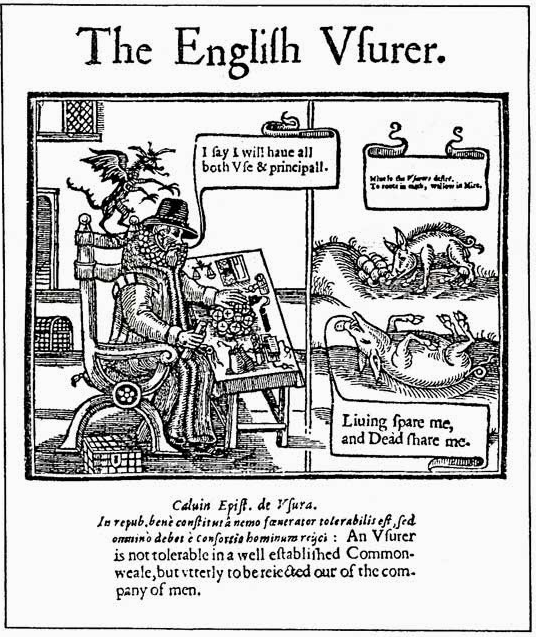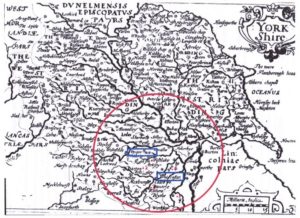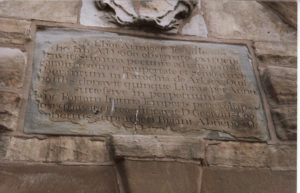The Devil of Doncaster
In 1614, Brian Cooke, ‘gentleman’ of Doncaster, complained to the Court of Star Chamber that Thomas Bevett, Original Bellamy, and twelve others, ten of them musicians, had defamed him. Motivated by “a long conceived and undeserved mallice” against him, the defendants, Cook claimed, conspired together to bring him into “disgrace, shame and reproche in the world.”* They tried to do this by means of a libellous poem which, over the course of four months beginning in November 1613, Bevett, Bellamy and their collaborators distributed, sang, and read aloud privately and publicly, in various places in Yorkshire and Nottinghamshire. The home towns of the musicians were probably the places where the libel was performed, with John Still’s inn being the specific venue in “Tuyworth” (Torworth), in north Nottinghamshire.

The English usurer; or usury condemned, by the most learned and famous diuines of the Church of England…’, 1634 (Folger Shakespeare Library STC 3129).
The poem, which consists of twelve eight-line stanzas, portrays Brian Cooke as a usurer and a thief—he, in the words of the refrain, is “The Devil of Doncaster.” We do not know what occasioned the dispute between Cooke, Bevett, and Bellamy, but others had felt the pinch of Brian Cooke’s sharp practices. In 1610, George Shepperde stated the terms of the loan he had received, rejected Cooke’s summary of them, and then averred “that the said Compleynant goeth aboute to make a praye of the defendant ” (Cooke v Shepperde, C2/JasI/C25/10). Of the defendants, Original Bellamy at least might well have defaulted on a loan from Cooke. He seems to have been a young gentleman in need of money: by 1618 two defendants in “Bellamy v Fretwell” deposed that this case was merely a vexatious attempt by Bellamy to “releeve his desperate and decayed estate” (STAC 8/71/7).
Many libellous poems are bawdy in content and crude in style. “The Devil of Doncaster,” however, is remarkable in its confident handling of rhythm and rhyme, its array of classical allusions (to Pluto, Cerberus, Rhadamanthus, Prometheus, Briareus, Mercury, Scylla and Charbydis), and its pointed inclusion of almost all the main ideas in contemporary critiques of usury. The piece may have been sung to a popular tune, but its writer or writers must have been educated people. For a sample:
Breake your bonde but a daye
a minit or an hower
Straighte you become a praye
vnto this tyrantes power
Briarus hundred handes
bryanus passethe fayre
A thowsande lymed wandes
settes the devill of Doncaster
Eche where he baites for fishe
touche but his silver hooke
fforthwith youar made a dishe
vnto this raveninge Cooke
No dogge doth byte so sore
as dothe an vsurer
No devill deludethe more
then the devill of Doncaster
These stanzas identify the very thinly disguised target of the piece. ‘Bryanus’, an invented counterpart to mythological Briareus, names Brian, and he is, of course, the “raveninge Cooke” of the following verse.
In his bill of complaint, Cooke alleged that the defendants aimed “to overthrowe and take away his life and estate if theye could.” They certainly did not do that. He quickly went on to be elected a capital burgess, alderman, chamberlain, and mayor of Doncaster. The libellous song aimed at Brian Cooke seems to have had less impact on him than the singing used to torment Original Bellamy. In Bellamy v Waterhouse (1610; STAC 8/69/21), he complains that his riotous enemies “being all armed and weaponed” gathered at the gates of his house “showting, halloweing & sometymes singing … to the great terrour, feare, and annoyance of your said subiectes reste & and others of his family.” Nor had Bellamy and Cooke finished with one another. In 1621, the Journals of the House of Lords (II.236) report that Bellamy had been arrested in Nottinghamshire “at the suit of Bryan Cooke and others.” Was he arrested for debt? Had the consequences of that debt inspired a defamatory song about a demonic usurer of Doncaster? We know only that both men were to appear before the Lords, Brian Cooke “to answer for the contempt” in this action taken against Original Bellamy, who was now “one of the yeomen of his majesty’s guard.”
“The Devil of Doncaster”
STAC 8/113/3: Bevett vs. Cooke, 1613
Diplomatic Transcription Modernized Transcription
In gryslye Plutoes Cell In grisly Pluto’s cell
Where Sarbarues do wake Where Cerberus do wake
And Radamanthus dwell And Rhadamanthus dwell
and furious whipps doe shake And furious whips do shake
Devills on deceased men praye Devils on deceased men prey 5
but he I singe of here But he I sing of here
Waist{es} lyvinge wyght{es} awaye Wastes living wights away
the Divill of Doncaster The devil of Doncaster
The feines infarnall all The fiends infernal all
were angells once I knowe Were angels once I know 10
But throughe their pride did fall But through their pride did fall
from heaven to hell belowe From heaven to hell below
ffrom heaven this never fell From heaven this never fell
nor ever will come there Nor ever will come there
But was Creat in hell But was create in hell 15
donne, divill of Doncaster Done, devil of Doncaster
No catist paice Can houlde No Catist pace can hold
w{i}th this great Alcamiste With this great alchemist
Who turnes time into goulde Who turns time into gold
and silver when he liste And silver when he list 20
ffrom yeares moneths week{es} and daies From years months weeks and days
he extracts mettle pure He extracts metal pure
p{ar}asselciones all yielde praise Paracelsions all yield praise
to the devill of Doncaster To the devil of Doncaster
By mortgage, bills and bondes By mortgage, bills and bonds 25
like Conduite pypes he drawes Like conduit pipes he draws
ffrom men their good{es} & landes From men their goods and lands
into his grypinge Clawes Into his gripping claws
Money by monethe or weeke Money by month or week
paye double vse before Pay double use before 30
You maye here, if you seeke You may here, if you seek
the devill of Doncaster The devil of Doncaster
That vse before hande tayne The use beforehand ta’en
he vnto others lett{es} He unto others lets
W{hi}ch breed{es} new vse agayne Which breeds new use again 35
& that newe Coyne begett{es} And that new coin begets
Like wheate amongst the Chaffe Like wheat amongst the chaff
W{i}th sounde Coyne rotten ware With sound coin rotten were
Is com{m}onlye putt of Is commonly put off
by the devill of Doncaster By the devil of Doncaster 40
Like as the Vulture feed{es} Like as the vulture feeds
on damned Tytons brest On damnèd Titan’s breast
So by his cruell deed{es} So by his cruel deeds
poore people be opprest Poor people be oppressed
Whilest any bloud remaynes Whilst any blood remains 45
this house leache will not sture This house leech will not stir
Blood suckinge still sustaynes Blood sucking still sustains
this devill of Doncaster This devil of Doncaster
Suche Cruell Crocodyles Such cruel crocodiles
seeminge Compassionate Seeming compassionate 50
W{i}th fayned teares & Wyles With feignèd tears and wiles
draw fooles vnto the baite Draw fools unto the bait
Then like Cheribdis gulfe Then like Charbydis gulf
men & meanes they devoure Men and means they devour
Not hells mouthe gapethe halfe Not hell’s mouth gapeth half 55
like the devell of Doncaster Like the devil of Doncaster
Breake yo{u}r bonde but a daye Break your bond but a day
a minit or an hower A minute or an hour
Straighte you become a praye Straight you become a prey
vnto this tyrant{es} power Unto this tyrant’s power 60
Briarus hundred handes Briarus’ hundred hands
bryanus passethe fayre Brianus passeth fair
A thowsande lymed wand{es} A thousand limèd wands
sett{es} the devill of Doncaster Sets the devil of Doncaster
Eche where he baites for fishe Each where he baits for fish 65
touche but his silver hooke Touch but his silver hook
fforthw{i}th youar made a dishe Forthwith you’re made a dish
vnto this raveninge Cooke Unto this ravening cook
No dogge doth byte so sore No dog doth bite so sore
as dothe an vsurer As doth the usurer 70
No devill deludethe more No devil deludeth more
then the devill of Doncaster Than the devil of Doncaster
Not winged Mercurye Not wingèd Mercury
w{i}th his Conveniente fyne With his convenient fine
Can matche in theverye Can match in thievery 75
this nimble devill of myne This nimble devil of mine
Book{es} close he can Convey Books close he can convey
throughe a stronge studye doore Through a strong study door
Doore, bolt{es}, and barrs obey Door, bolts, and bars obey
this devell of Doncaster This devil of Doncaster 80
Beinge once to entertayne Being once to entertain
some worthye p{re}llet ate Some worthy prelatate
Earthe pott{es} he dothe disdayne Earth pots he doth disdain
and stole his neighbo{u}rs plate And stole his neighbour’s plate
But by Chance beinge spyde But by chance being spied 85
from thence he flitted farre From thence he flitted far
And ever since hathe plaide And ever since hath played
the devill of Doncaster The devil of Doncaster
W{i}th thefte he did begyn With theft he did begin
w{i}th Cheatinge he p{ro}ced{es} With cheating he proceeds 90
To shorte his daies of sinne Too short his days of sin
growe apace hempen weed{es} Grow apace hempen weeds
And all yonge gentlemen And all young gentlemen
that hould{es} yo{u}r lyvinge deare That holds your living dear
Before you bleede take heed Before you bleed take heed 95
of the devill of Doncaster Of the devil of Doncaster
Transcription and translation by Ted McGee, University of Waterloo, 8 March 2016.

Map of Yorkshire showing location of Doncaster, etc., c.1600.

Funerary monument of Bryan Cooke on the side of the Almshouses he founded in Arksey (n. Doncaster) his will of 1660: ”Bryan Cooke of Wheatley in the county of York, Esq., by his last will and testament signed the third day of January A.D. 1660, appointed this building to be erected. A sum of money sufficient for that purpose being bequeathed, for the use of twelve persons, the most distressed by poverty and age in the parish of Arksey, to each of whom he left £5 annually, in succession for ever …” (at http://arkvillhistory.blogspot.co.uk/2012/04/cooke-family.html)
******
Here Is a list of “The Devil of Doncaster” Defendants:
| Thomas Bevett | South Kirkby | gentleman |
| Original Bellamy | Lambcote Grange | gentleman |
| James Bird | Torworth | musician |
| Ralph Bird | Torworth | musician |
| Abraham Chambers | Pontefracte | musician |
| Humfrey Clemett | Stainford | musician |
| Edward Gressame | Stainford | musician |
| John Harrison | Pontefract | musician |
| Thomas Harrison | Pontefract | musician |
| Thomas Hill | Pontefract | musician |
| Christopher Huscroft | Kirk Smeaton | yeoman |
| Thomas Key | Doncaster | musician |
| Thomas Peate | Stainford | musician |
| John Still | Torwoth | innkeeper |
*Unless otherwise noted, all quotations are from Bevett v Cooke et al. (STAC 8/113/3). All the documents quoted are in the collections of the National Archives, Kew. In the quotations, brackets indicate the extensions of abbreviations in the manuscripts.
This month’s Flower is very kindly provided by Ted McGee, editor (with Sylvia Thomas) of the REED West Riding volume.
